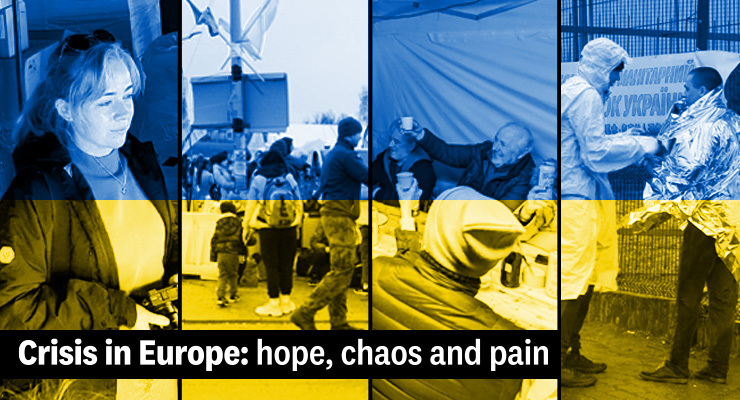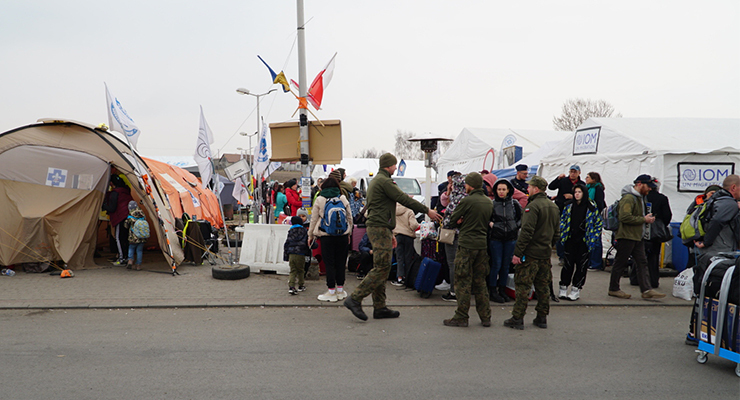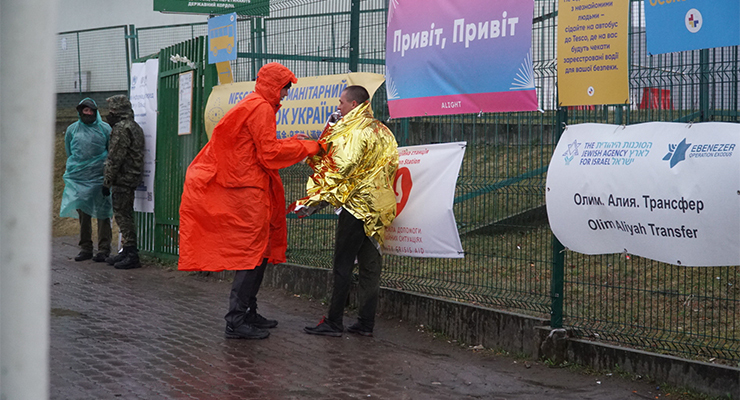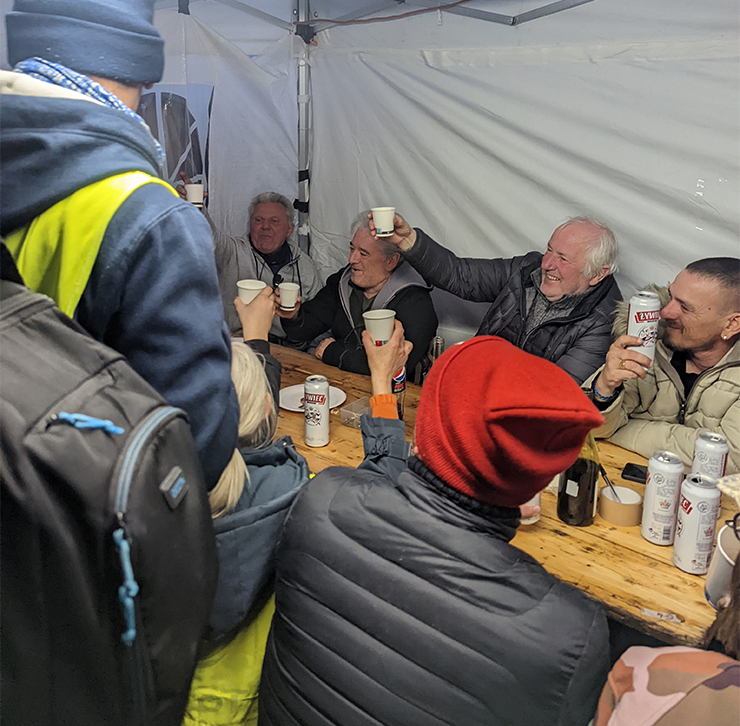
Hundreds of volunteers from all over the world have arrived at Medyka on the Polish border, just 86km from the besieged Ukrainian city Lviv, to help refugees. There’s a French group with two minivans transporting people to host homes, Sikhs cooking meals, vets caring for pets, and a mishmash of others handing out everything from toasties to tampons, trinkets to hot chips.
There’s a huge sense of disorganisation — many have simply shown up with no affiliate organisation, accommodation or plan of attack. Toilets are overflowing and there’s limited shelter from the rain.
Some volunteers are here for days; some have been here for weeks. During the day they work in their booths and at night stay up to drink and swap stories. Some sleep in hotels, others in tents, others on office floors. Space is limited, and many are frustrated at the lack of infrastructure for them.
Volunteers aren’t vetted. For those who simply show up, there’s little information on who they are, what skills they offer and what their motivations are. Their main form of identification is a worn yellow vest with their name and country of origin scrawled in sharpie.

Polish authorities have been slow to accredit NGOs. The Red Cross is the only organisation with official permission to work — even the UN International Organization for Migration, which has a longstanding office in the capital, Warsaw, isn’t authorised to provide support during an emergency.
“It’s been completely chaotic,” Red Cross volunteer Grzegorz Styś says.
During the first few days of the invasion in late February, when 30,000 refugees were crossing the border daily, volunteers could come and go across the border as they pleased. Now accredited Red Cross workers are the only people who can. The rest must go through a migration express lane and have their passports stamped like everyone else.
“Everyone wearing a yellow vest could name themselves as a volunteer,” Styś says. He was working closely with police to report people acting suspiciously.
The volunteers are largely driven by good intentions. They heard of a crisis and wanted to help. But others are driven by their egos and a sense of saviourism, keen to take selfies and share their sacrifice on social media. Some still seek an adrenaline high and arrive eager to get to the frontline to fight but are dissuaded at the last minute. It’s often not clear what skills or qualifications they have.
One man from the US introduces himself as the “chief medic”. A former marine, he developed PTSD after fighting in Afghanistan. During a mental health crisis he was prescribed Seroquel, a treatment for anxiety, along with strong sedatives. He brought the drugs with him to the Medyka border crossing and when he feels volunteers and the occasional refugee needs them he hands them out. It’s not clear what his medical qualifications are.

A gospel missionary group called Awakening Europe stands in no-man’s-land where migrants are funnelled through borders surrounded by high fences topped with razor wire. Most Ukrainians are Orthodox Christians, but they still call for them to sing along to hymns and “know Jesus”. A Ukrainian woman beside me rolls her eyes. “We’re so tired, now this?” she mutters.
But the informal arrangements also allow good work to be done: Stacey Henderson, a paramedic and firefighter from the US, has travelled previously to crises in Honduras and Mexico to offer her skills. Being placed with an official organisation takes too much time, so she wanders across the border with a huge suitcase full of medical supplies to donate.
“We heard there were limited medical supplies on the other side of the border, so I figured I’d come to drop some off and offer medical help where I can,” she tells Crikey.
But UN Internation Organization of Migration site manager Daniel Coyle says there’s still a lot to do. A large storm is passing, bringing heavy rain, and freezing temperatures are about to hit.
“The scale of the emergency is massive compared to global and historical standards,” he says. “We’re working really hard to try and improve the sites, especially before the incoming rains. It’s a bit quieter now — but that doesn’t mean we should ease up other preparedness work.”
Identification, rain cover, waste management and hygiene services were key areas that need improvement, he says. Less than five metres from where we speak, a portable toilet is about to overflow.

“We’re concerned about trafficking and we’re working closely with local authorities and different organisations to provide training on counter-trafficking and flag issues we see with the authorities as soon as possible,” he says.
He urged volunteers to participate in official relief work run by organisations coordinating with the local government: “We really want to make sure only good people are participating in these activities. If there’s space for people with bad intent, hurt might come to refugees.”
Mike Zuckerman works with Alight, a US refugee charity, and helped establish a rapid response team which provides ID tags to volunteers, ensuring those working have someone from an official organisation responsible for them. The informal arrangements were as much a blessing as a curse, he says.
“Because there’s been limited formal response from the Polish government, it’s resulted in a welcome that’s different from the sterile institutional response — in some ways, the vacuum has allowed positive things to happen,” Zuckerman says.
“It was a stopgap — but now we’re worrying about trafficking of people, and trying to make sure everyone who volunteers here is approved by the police, or to simply have a better idea of who is onsite.”








I take my hat off to the people and govts in dealing with the tefugees coming out of Ukraine. Even England is finally coming to the party, sort of. I’m not surprised our govt is doing as little as possible. I’m waiting for Morrison to say it’s up to the states to deal with.
At least if the states were dealing with it, there would probably be some good outcomes for both refugees and local society.
Hear, hear!
Good informative article Amber
An article in an English newspaper (could have been the Guardian?) on the maltreatment of coloured refugees (Nigerian,Indian,Pakistanis) who were denied entry on trains and buses leaving Ukrainian cities, but had to wait after being sent to back of queues. Then denied food and shelter on reaching Poland.
Sure there are worse incidents occurring – hope journalists will publicise the situation.
Most of Eastern Europe is in the thrall of the ultra right.
Thank you Amber.
Thankyou Amber. Another informative and important article.